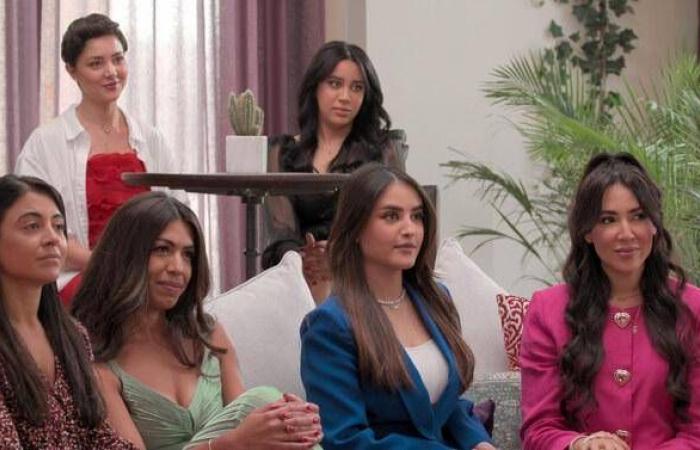In a notable scene from the first season of Love Is Blind: HabibiKarma, a professional dancer, performs graceful movements under the complicit gaze of her friends. But Ammar, his partner, remains frozen, his face contorted with contempt, a form of undisguised disgust. “It’s too vulgar,” he says coldly, summarizing in one sentence the tensions that exist between the need for modernity for some and the patriarchal expectations still present in certain Arab societies. The silence that follows is heavy, but Karma does not give in. She ends their relationship, saying she won’t sacrifice her passion to satisfy standards she doesn’t identify with. This sequence, widely commented on on social networks, has become a symbol of female resistance, sparking heated debates on the place of women in Arab societies.
Inspired by the American show Love is Blindlaunched in 2020 on Netflix, the pan-Arab version keeps the same essence and the same concept that made it successful: singles, 15 men and as many women, seek love without ever seeing each other, interacting only through conversations in capsules, until they decide whether or not to get engaged.
Here, what counts are intellectual affinities. If there is a “match”, there will be a marriage proposal, always blind. The couple will then meet… A real success, this franchise, after having been adapted in several countries, has reached cultures more sensitive to certain subjects which, elsewhere, are taken for granted.
The star presenters of “Love is Blind: Habibi”: Khaled Saqer and his wife Elham Ali. Netflix photo
The central idea is simple but effective: can love transcend physical appearance in an era dominated by dating apps and looks. Can intellectual affinities suffice and triumph in our societies where appearance is much more essential than being? Where Western editions (US, Australia, UK) focus on drama, conflict and normal generational dynamics, the Arabic version goes further and stands out for its ability to explore specific issues in the region. .
The platform adapted the concept to Brazil, Japan, the United Kingdom and then the United Arab Emirates with Love Is Blind: Habibi. The famous actress Elham Ali and her husband Khaled Saqer are the hosts.
Launched in October, the Arabic adaptation quickly seduced or at least captured the attention of viewers. Filmed in Dubai with participants from Lebanon, Syria, Morocco and Tunisia, the show rose to sixth place in the world among non-English-speaking Netflix series, recording 1.6 million views according to The National. With its unique format, which favors emotional connection before any visual contact, the oriental version of reality TV plays on the contrast between tradition and modernity. Its success rests on its ability to address issues deeply rooted in Arab societies, while remaining captivating and entertaining.
Read also
Sex, low blows and the decline of Loana: the story of the “Loft” revisited
A laboratory of hearts and mentalities
In this pan-Arab adaptation, each interaction becomes a site for exploring cultural tensions. Under its air of light and entertaining reality TV, the show touches on deep themes: patriarchal norms, femininity and emancipation.
Take Karma. By refusing to comply with her partner’s demands, she embodies a modern Arab woman, breaking the chains of oppressive traditions. Nour, another participant, also opposes a demanding man who seeks to lock her into a traditional role. These stories are not simple adventures, but manifestos of personal affirmation.
When intimacy becomes an act of rebellion
The famous “pods”, where candidates discover each other blindly, become sanctuaries where appearance and external expectations no longer have any power. These intimate exchanges highlight societal and personal divides.
“We thought the show would reflect our traditions, but it’s more a fight between male control and female assertion,” summarizes Randa Douaibes, a Lebanese viewer. Miriam Khalil adds: “Seeing Karma break up with Ammar because he didn’t respect her passion was like seeing an entire generation free itself. »
Love Is Blind: Habibi therefore goes beyond its role as a light reality TV show. In each episode, she asks essential questions that shake up the established order: how to balance modernity and tradition? Desires and prohibitions? Can women gain independence without being judged? And above all, what does “finding love” mean in a context where relationships remain so regulated?
Social networks are on fire. Certain scenes, like that of Karma, become symbols. “She chose her happiness instead of pleasing a man. This is the real revolution,” writes a user on the X network.
Emancipation in prime time
Beyond the love quest, Love Is Blind: Habibi celebrates an Arab youth who refuses to blindly conform to patriarchal expectations. The participants, imperfect but authentic and sincere, launch a dialogue on what it means to love and be loved in a society where prohibitions now collide with a need for individual freedom.
By mixing raw emotion and cultural reflection, the show positions itself as a catalyst for change. It also shows that emancipation does not come through a rejection of traditions, but through their reinvention.
After the first season released on October 10, 2024 and the subsequent success, no renewal announcement has been made regarding the release of season 2 of Love Is Blind: Habibi on Netflix. However, the 8th season of the parent series has indeed been renewed.
In a notable scene from the first season of Love Is Blind: Habibi, Karma, a professional dancer, performs graceful movements under the complicit gaze of her friends. But Ammar, his partner, remains frozen, his face contorted with contempt, a form of undisguised disgust. “It’s too vulgar,” he says coldly, summarizing in one sentence the tensions that…
- -






